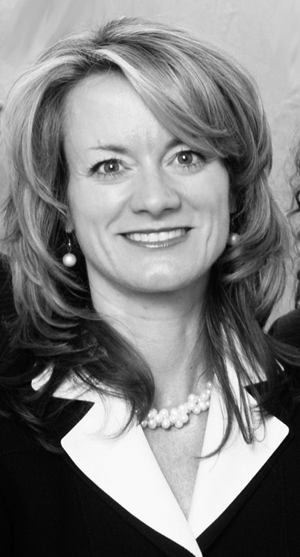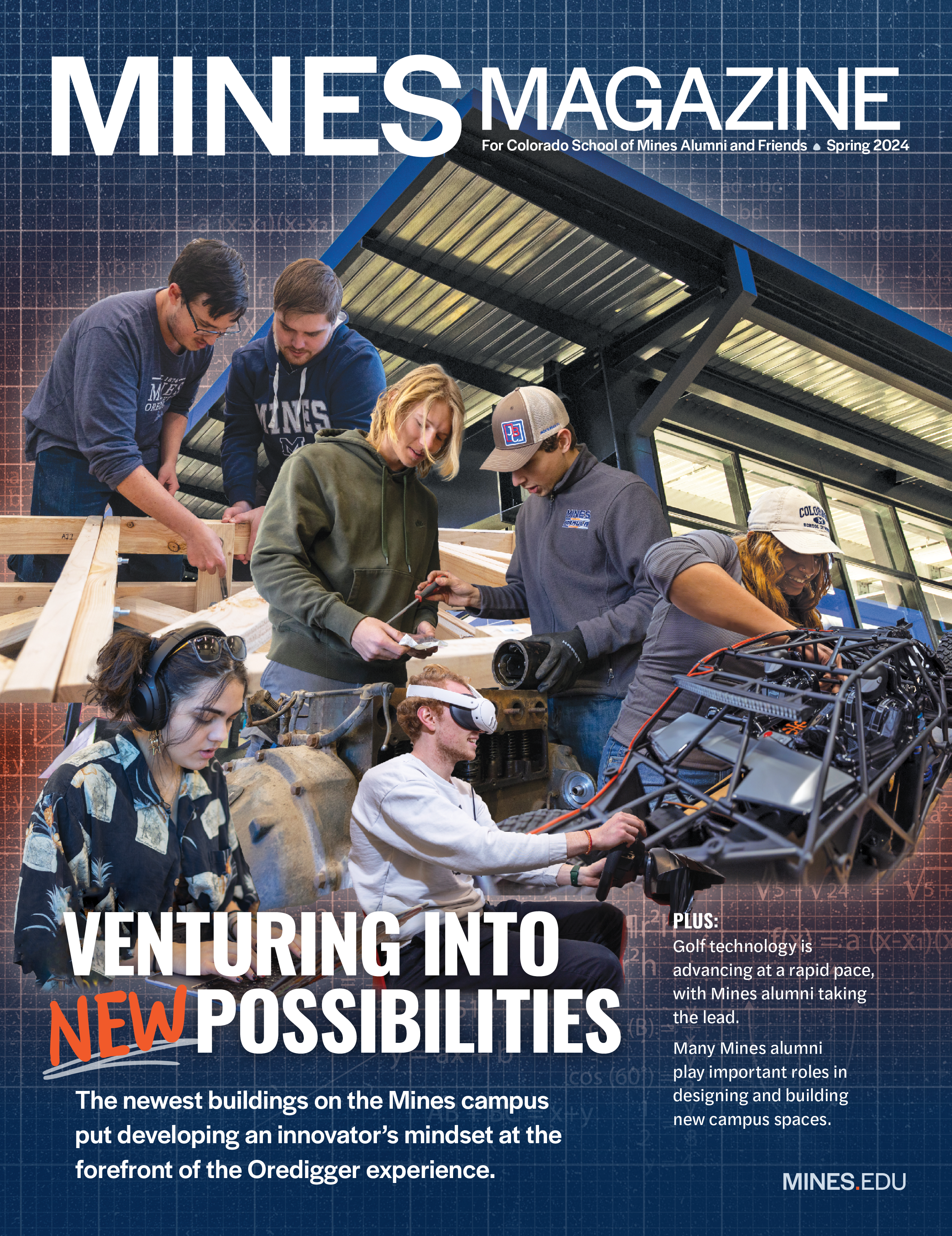Expanding entrepreneurial roots

Long renowned for turning out top engineers and scientists, Mines is increasingly distinguishing itself in another way—as a hotbed for entrepreneurship.
Mines has tapped into a deep groundswell of enthusiasm among its students, faculty and alumni for cutting-edge ideas and the startups and other companies that bring them to life. As the culture of entrepreneurship at Mines grows, it is enhancing the school’s reputation as a breeding ground for promising business ventures and helping local companies gain the support they need to climb the arduous ladder to success.
Center of innovation
Over the past year, Mines’ entrepreneurial focus has expanded. The Division of Economics and Business, in collaboration with the Center for Entrepreneurship and Innovation, now offers several entrepreneurship
classes, ranging from introductory subjects to the more advanced, such as “Hacking for Defense,” in which students
work to solve real-world national security challenges presented by the U.S. Department of Defense and the intelligence community.
All entrepreneurial classes emphasize the practical aspects of developing a business and are taught by professors with help from co-instructors from Denver-area startups, who serve as mentors to the students.
“We reach out through our alumni network and sources in the Golden community to find mentors who have experienced the trials and tribulations of starting a business. They can help students navigate barriers as they work through a business problem or validate their ideas,” said Sid Saleh, an economics and business teaching associate professor who serves as associate director of the center.
Mines also interacts with the local startup community through The Wright, a nonprofit that sponsors an annual innovation challenge designed to help companies in the outdoor activities industry. Ten companies come to campus
to present “reverse pitches,” describing their plans and obstacles and soliciting student help. Students from Mines and other Denver-area schools form teams that work with mentors to solve the problems.
“It’s not abstract stuff from a class—they engage with real problems provided by real companies,” Saleh explained.
This year’s challenge illustrates how the program benefits both students and startups. Three Mines teams worked with Cipher Skin, a Denver startup that patented a sensored mesh material that can capture data on human movement to help athletes and people recovering from injuries. But first, the company needed help miniaturizing its sensors and incorporating them into clothing.
One Mines team designed a shirt that measures heart rate and arm movement. Another developed a working prototype of leggings that measure injury recovery. A third team took a completely different approach, using the material to wrap around an oil or gas pipeline to predict failure.
Working with real companies allows students to develop a new set of skills, said Werner Kuhr, director of the Center for E&I. “Mines students have always had a good reputation for their technical ability. But when they talk to stakeholders, they develop their personal skills and learn to understand the problems the company is trying to solve.”
Reaching out to entrepreneurs
Entrepreneurs in the Front Range area get a boost from the E&I Interest Group, which facilitates networking opportunities with other startup owners, as well as experienced founders who remember the uncertainties and challenges they faced in early days.
“I’m able to connect with people who have been there and done that. They helped me step into the role of CEO and figure out how to put data behind my decisions while keeping the big picture in mind,” said Blakelee Mills ’10, the CEO of Golden Software. Though her company is not a startup, she made fundamental changes after purchasing it in 2014. The E&I Interest Group has provided guidance and confidence along the way.
A couple of years ago, a member connected her with a firm that provided training to help her team, many of whom work remotely, collaborate better. “The training pushed us outside of our technical comfort zone, as it forced us to better understand our behaviors and taught us how to adapt to our teammates to better communicate with one another. It definitely helped, and we still apply the concepts today,” said Mills, who is also working with the firm for personal leadership coaching. “I know I can reach out to anyone in the E&I group and say, ‘Can you help me out?’ and they most certainly do.”
The E&I Interest Group also connects startups to Mines students. William Loopesko MS ’12 was invited to Saleh’s entrepreneurship class to discuss his company PuppTech, which allows dog owners to monitor their pets in cars or kennels for signs of distress. Two students in the class volunteered to work with him as interns, designing the casing for his monitor.
“I’m not a mechanical engineer, and this turned into a significantly larger project than I imagined,” Loopesko said. “There are specific design concerns for injection molding that I didn’t know about, but these kids were learning about it in school.” The students worked directly with his manufacturer to develop a smooth, cost-effective container for the monitor.
Angel investors
E&I members encourage startup founders to pitch their ideas to the Rockies Venture Club, an angel group that invests in 25 companies a year, mostly in Colorado and the surrounding area. Loopesko, who was invited to pitch, acquired several “followers”—investors with a serious interest in the company who provide the first step toward gaining funding.
The club became involved with Mines after E&I members began attending its workshops in Denver for entrepreneurs and investors. After seeing their enthusiasm and learning about Mines’ growing culture of entrepreneurship, the club formed a new investor group in Golden in partnership with Golden-based venture catalyst Traxion. Many members are Mines alumni, and the group meets monthly at the school.
Though the Golden group is only a year old, 50 percent of its members have already made investments through the club. “That’s a really high response rate for a newly formed group,” said Rockies Venture Club Managing Director Dave Harris.
Because the group has taken a special interest in clean energy technology, the club will partner with the Colorado CleanTech Industries Association to launch a second investor group at Mines centering on startups in that industry.
Rockies Venture Club also works with the school, hiring entrepreneurial-minded students as interns, such as computer science student Torin Johnson.
“It’s helping me understand a lot more about how startups work, especially in the early stages. I’ve also learned how investors think and look at financing,” Johnson said.
Through his work with the club and his entrepreneurship classes at Mines, Johnson is learning important skills to complement his engineering training. “You’re looking for pain points people have,” he said. “It’s not like engineering, where you’re given problems to solve. You need to find
the problems.”
Through its classes, alumni groups and networking with investors and startups, Mines is rapidly becoming a force for innovation in the Denver area. But the school’s work is nowhere near complete.
“We’re just getting warmed up,” Saleh said. Working with the E&I Interest Group, the center is considering developing workshops, boot camps and online courses for alumni who want to hone their entrepreneurial skills. Saleh continued, “We’ve got the student programs in place. Now we want to bring in companies and alumni. Sharing problems is hugely beneficial to students, entrepreneurs and industry.”



